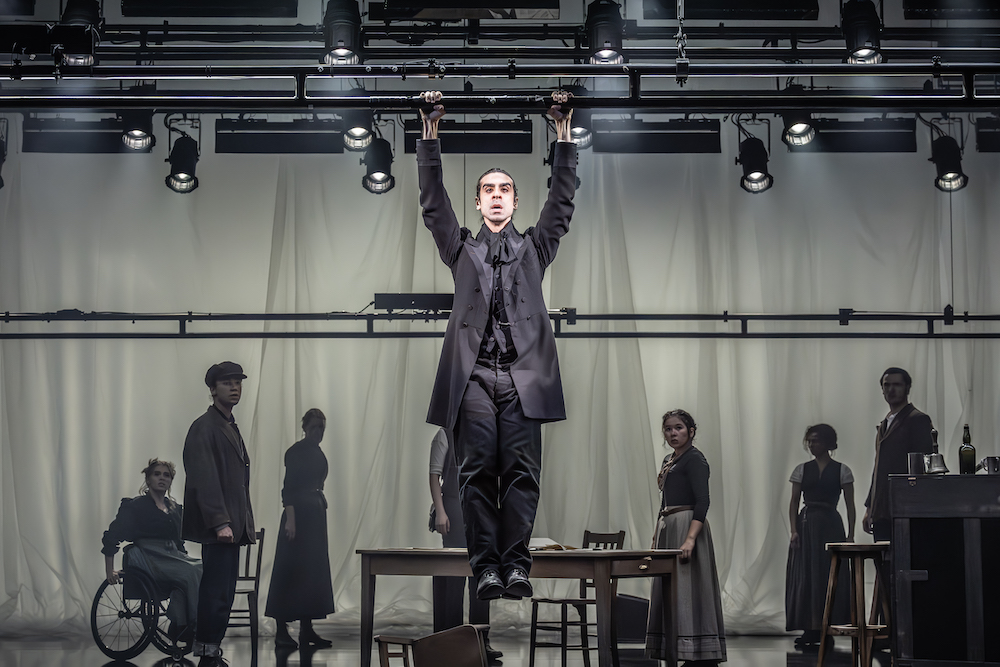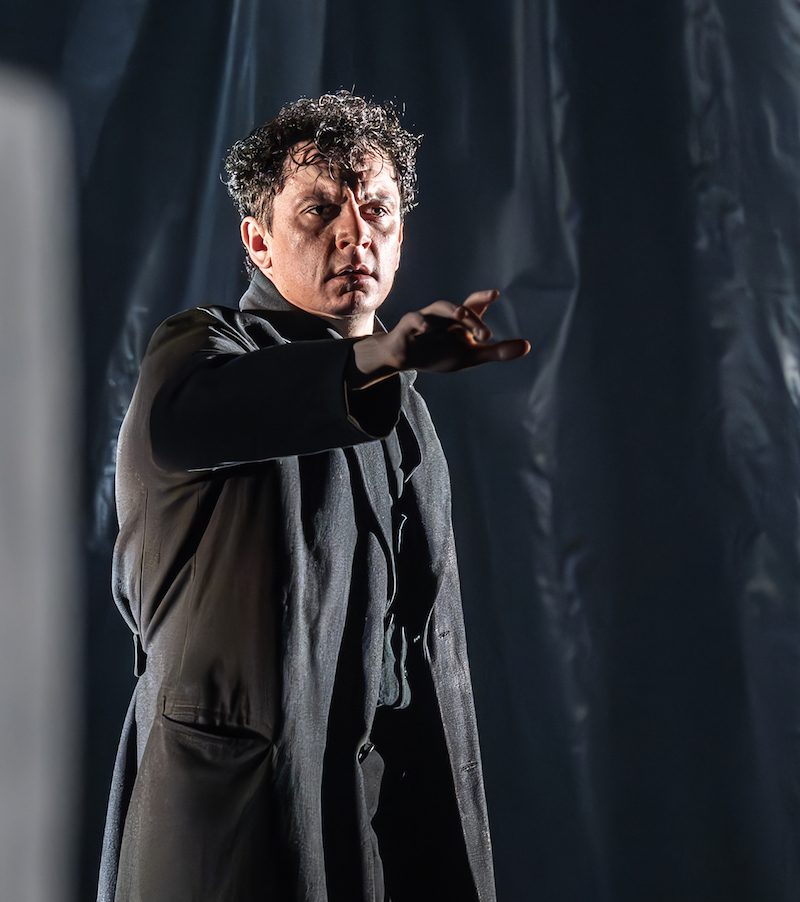“He do the police in different voices.” If ever one phrase summed up a work of fiction, and the art of its writer, then surely it is this description, by Charles Dickens in his 1865 novel, Our Mutual Friend, of his character Sloppy’s ability to read aloud from a newspaper. Ironically enough the book itself is one of Dickens’s least exuberant performances, written in his maturity, and with enormous and unnecessary detail (800 pages worth).
Its complex plot has now been adapted for the National Theatre by Ben Power, with music by PJ Harvey. But is this the best way to tell this story? Dickens’s plotting is typically convoluted: a tyrannical father leaves his fortune to his estranged son, but on condition he marries a girl whom the father met only once when she was having a childish tantrum. Now grown up, Bella Wilfer is told that she is a widow before she ever gets married because her husband to be, on his return to London, has drowned in the Thames. His body is found by Gaffer Hexam and his daughter Lizzie, who trawl the river looking for the dead. The plot shows what happens when Lizzie is courted by Eugene Wrayburn, a lawyer, and Bella by a mysterious stranger who calls himself John Rokesmith.  This adaptation, which begins by sticking very closely to the book, is set in various different parts of London. In Limehouse, Lizzie lives not only with her father but also with Charlie, her brother, who wants to rise in society through being educated by schoolmaster Bradley Headstone, a sinister figure who is attracted to Lizzie. In Holloway, Bella lives with her parents and sister, but is taken up by Hampstead-bound Noddy Boffin, who has suddenly become rich due to an unexpected legacy. Additional characters include Lizzie’s Lambeth friend Jenny Wren, the dolls’ dressmaker, and the nasty Rogue Riderhood and the virtuous Inspector Bucket.
This adaptation, which begins by sticking very closely to the book, is set in various different parts of London. In Limehouse, Lizzie lives not only with her father but also with Charlie, her brother, who wants to rise in society through being educated by schoolmaster Bradley Headstone, a sinister figure who is attracted to Lizzie. In Holloway, Bella lives with her parents and sister, but is taken up by Hampstead-bound Noddy Boffin, who has suddenly become rich due to an unexpected legacy. Additional characters include Lizzie’s Lambeth friend Jenny Wren, the dolls’ dressmaker, and the nasty Rogue Riderhood and the virtuous Inspector Bucket.
Power sharpens the focus of the plot by dispensing with Silas Wegg the ballad seller, Mr Venus the taxidermist, Riah the money lender, the Podsnaps and the Veneerings, and a score of others, including the poor lamentable Sloppy. This radical pruning is a very good move because it foregrounds the twin coming-of-age stories of Lizzie and Bella, and Power also shifts attention away from the novel’s satire of the dust heap business and emphasises instead the Thames, the waterway from which this version takes its name. This gives the whole piece a clearer symbolism as the metropolis’s river is both a means of enrichment and a source of death. It runs dirty, but also yields riches. It both brings people together and cuts the city in two.
The addition of music by PJ Harvey mostly works very well. With words written by Harvey and Power, with the exception of the poem “London, My Beautiful” by FS Flint, the songs both evoke the river, streets and fog of Victorian London, and provide depth to the characters. Most notably, the sinister song “Bradley Headstone” – brilliantly sung by the terrific Scott Karim (pictured above) – is a chillingly atmospheric character piece. It is also obvious, to me anyway, that the ensemble songs are often more impactful than the solo pieces, which occasionally feel a bit thin, and could have benefitted from better singers in the cast.
 Ian Rickson’s production is strong on moody Victori-noir with Bunny Christie’s bare dark set using a handful of wooden tables and chairs, while five overhead lighting rigs dip down to increase the claustrophobia or ripple like the waters of the Thames. With the characters narrating their stories often directly to the audience, the plotting is clear and Dickens’s sprawling epic comes across more strongly in this trimmed down version. Power’s revelation of the identity of the stranger at the end of the first half is an excellent coup de théâtre, but the running time is still well over three hours, and the last sections feel both baggy and overly explicit. Too much explanation, not enough drama.
Ian Rickson’s production is strong on moody Victori-noir with Bunny Christie’s bare dark set using a handful of wooden tables and chairs, while five overhead lighting rigs dip down to increase the claustrophobia or ripple like the waters of the Thames. With the characters narrating their stories often directly to the audience, the plotting is clear and Dickens’s sprawling epic comes across more strongly in this trimmed down version. Power’s revelation of the identity of the stranger at the end of the first half is an excellent coup de théâtre, but the running time is still well over three hours, and the last sections feel both baggy and overly explicit. Too much explanation, not enough drama.
So while it’s hard to feel very much for individual characters in this panorama of darkest London, the modern parallels of power, poverty and pollution are clear from the start. The lightly feminist approach to the different plights of Lizzie and Bella, who both struggle to free themselves from loving but oppressive family members, gives the play a contemporary sensibility. Meanwhile, the gothic melodrama of Headstone, who proposes marriage in a graveyard, resonates with the insistent tales of death by drowning. At the start of this production the whole cast rise up from beneath the stage like a gallery of revenants.
I like the lyrics of the songs, which are direct and unpretentious, and Harvey’s mixture of dirge and gloom suits the atmosphere of this version of the novel very well. The large cast of some 20 actors tell the story of how love eventually frees itself of the mud and murk of poverty very effectively, although despite the sentimentality of the ending there are few scenes that actively grip your emotions. I think Bella Maclean’s Bella and Ami Tredrea’s Lizzie do a good job as energetic modern-style heroines, while newcomer Ellie-May Sheridan’s Jenny Wren gets the most laughs.
Of the men, I was most impressed by Karim’s stalker Headstone, and Peter Wight’s contrastingly affable Boffin. The working-class Gaffer Hexam, Charlie Hexam and Riderhood come across strongly in performances by Jake Wood, Brandon Grace and Joe Armstrong, while the putative male saviours – Tom Mothersdale’s Rokesmith (pictured above left) and Jamael Westman’s Wrayburn – add shades of character to what could have been mere cardboard cutouts. This play with songs is a very successful solution to the problem of adapting Dickens’s last completed novel for the stage – and Rickson’s production, with its beautiful stage pictures, is a hauntingly atmospheric tour de force.















Add comment